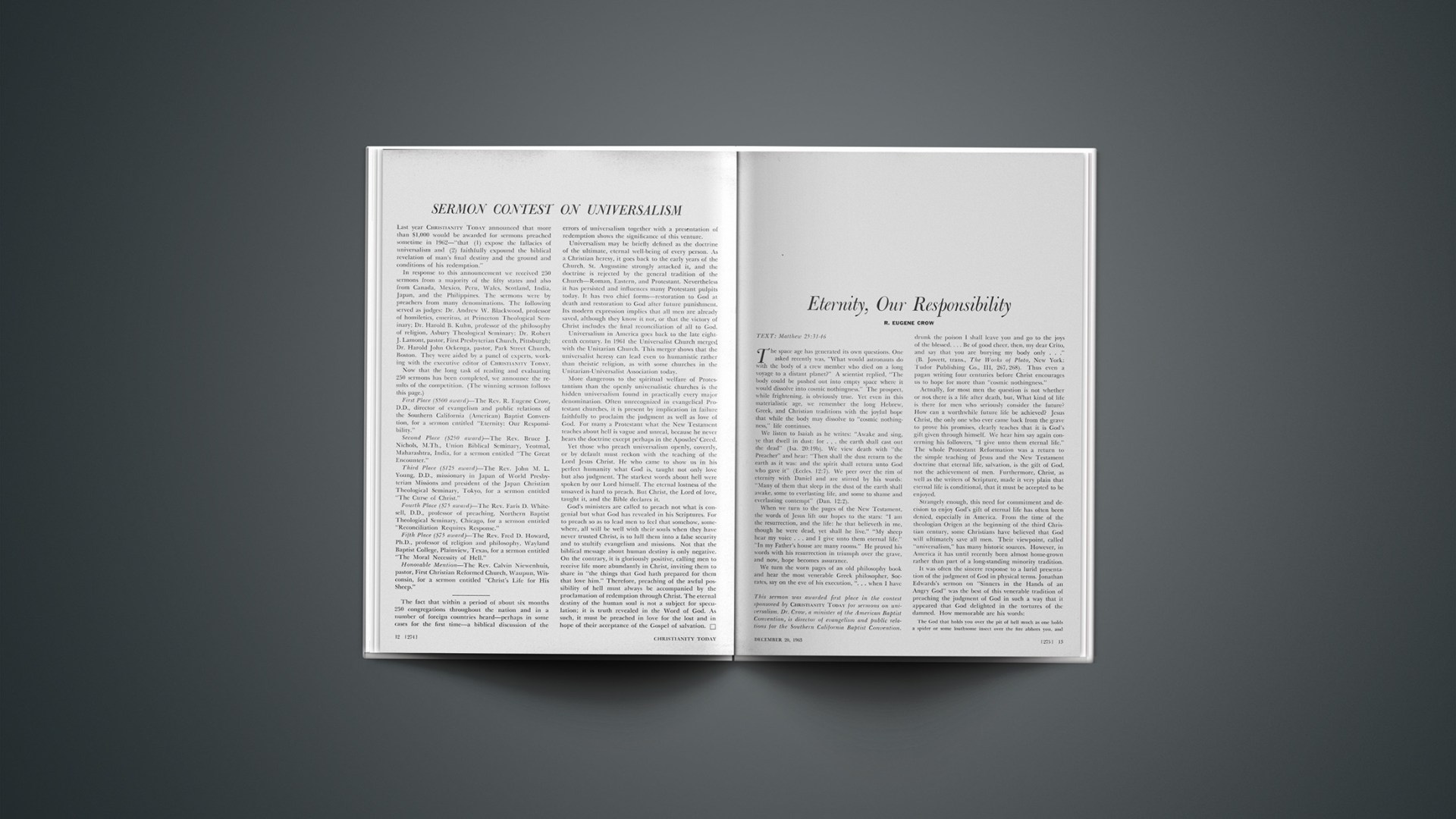Last year CHRISTIANITY TODAY announced that more than $1,000 would be awarded for sermons preached sometime in 1962—“that (1) expose the fallacies of universalism and (2) faithfully expound the biblical revelation of man’s final destiny and the ground and conditions of his redemption.”
In response to this announcement we received 250 sermons from a majority of the fifty states and also from Canada, Mexico, Peru, Wales, Scotland, India, Japan, and the Philippines. The sermons were by preachers from many denominations. The following served as judges: Dr. Andrew W. Blackwood, professor of homiletics, emeritus, at Princeton Theological Seminary; Dr. Harold B. Kuhn, professor of the philosophy of religion, Asbury Theological Seminary; Dr. Robert J. Lamont, pastor, First Presbyterian Church, Pittsburgh; Dr. Harold John Ockenga, pastor, Park Street Church, Boston. They were aided by a panel of experts, working with the executive editor of CHRISTIANITY TODAY.
Now that the long task of reading and evaluating 250 sermons has been completed, we announce the results of the competition. (The winning sermon follows this page.)
First Place ($500 award)—The Rev. R. Eugene Crow, D.D., director of evangelism and public relations of the Southern California (American) Baptist Convention, for a sermon entitled “Eternity: Our Responsibility.”
Second Place ($250 award)—The Rev. Bruce J. Nichols, M.Th., Union Biblical Seminary, Yeotmal, Maharashtra, India, for a sermon entitled “The Great Encounter.”
Third Place ($125 award)—The Rev. John M. L. Young, D.D., missionary in Japan of World Presbyterian Missions and president of the Japan Christian Theological Seminary, Tokyo, for a sermon entitled “The Curse of Christ.”
Fourth Place ($75 award)—The Rev. Faris D. Whitesell, D.D., professor of preaching, Northern Baptist Theological Seminary, Chicago, for a sermon entitled “Reconciliation Requires Response.”
Fifth Place ($75 award)—The Rev. Fred D. Howard, Ph.D., professor of religion and philosophy, Wayland Baptist College, Plainview, Texas, for a sermon entitled “The Moral Necessity of Hell.”
Honorable Mention—The Rev. Calvin Niewenhuis, pastor, First Christian Reformed Church, Waupun, Wisconsin, for a sermon entitled “Christ’s Life for His Sheep.”
The fact that within a period of about six months 250 congregations throughout the nation and in a number of foreign countries heard—perhaps in some cases for the first time—a biblical discussion of the errors of universalism together with a presentation of redemption shows the significance of this venture.
Universalism may be briefly defined as the doctrine of the ultimate, eternal well-being of every person. As a Christian heresy, it goes back to the early years of the Church. St. Augustine strongly attacked it, and the doctrine is rejected by the general tradition of the Church—Roman, Eastern, and Protestant. Nevertheless it has persisted and influences many Protestant pulpits today. It has two chief forms—restoration to God at death and restoration to God after future punishment. Its modern expression implies that all men are already saved, although they know it not, or that the victory of Christ includes the final reconciliation of all to God.
Universalism in America goes back to the late eighteenth century. In 1961 the Universalist Church merged with the Unitarian Church. This merger shows that the universalist heresy can lead even to humanistic rather than theistic religion, as with some churches in the Unitarian-Universalist Association today.
More dangerous to the spiritual welfare of Protestantism than the openly universalistic churches is the hidden universalism found in practically every major denomination. Often unrecognized in evangelical Protestant churches, it is present by implication in failure faithfully to proclaim the judgment as well as love of God. For many a Protestant what the New Testament teaches about hell is vague and unreal, because he never hears the doctrine except perhaps in the Apostles’ Creed.
Yet those who preach universalism openly, covertly, or by default must reckon with the teaching of the Lord Jesus Christ. He who came to show us in his perfect humanity what God is, taught not only love but also judgment. The starkest words about hell were spoken by our Lord himself. The eternal lostness of the unsaved is hard to preach. But Christ, the Lord of love, taught it, and the Bible declares it.
God’s ministers are called to preach not what is congenial but what God has revealed in his Scriptures. For to preach so as to lead men to feel that somehow, somewhere, all will be well with their souls when they have never trusted Christ, is to lull them into a false security and to stultify evangelism and missions. Not that the biblical message about human destiny is only negative. On the contrary, it is gloriously positive, calling men to receive life more abundantly in Christ, inviting them to share in “the things that God hath prepared for them that love him.” Therefore, preaching of the awful possibility of hell must always be accompanied by the proclamation of redemption through Christ. The eternal destiny of the human soul is not a subject for speculation; it is truth revealed in the Word of God. As such, it must be preached in love for the lost and in hope of their acceptance of the Gospel of salvation.










